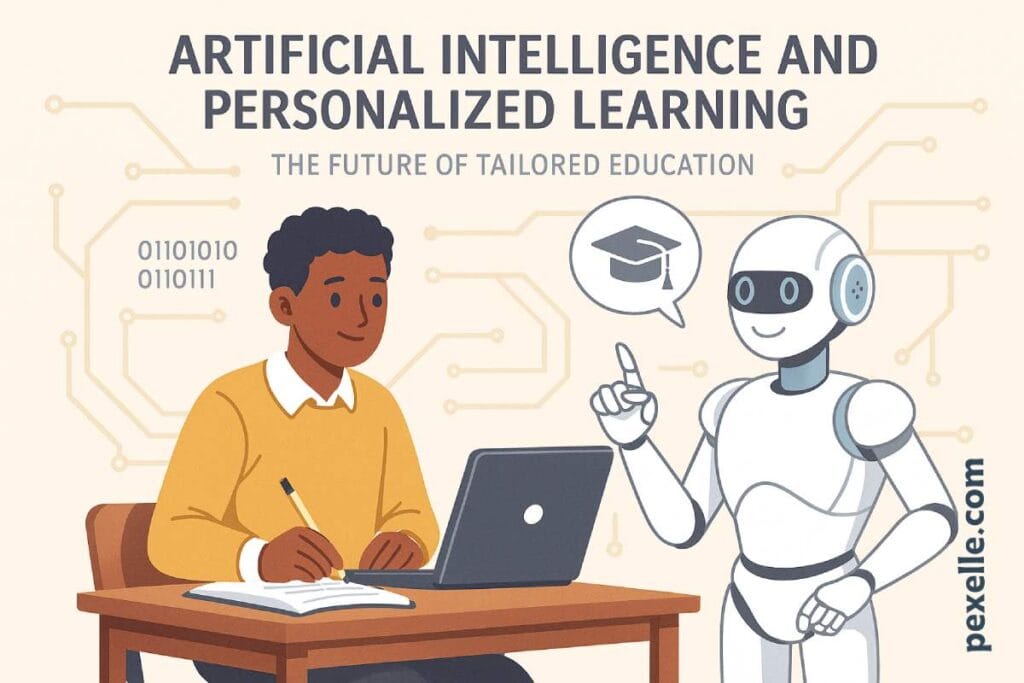Artificial Intelligence and Personalized Learning: The Future of Tailored Education

Introduction: A Paradigm Shift in Learning
The traditional one-size-fits-all approach to education is quickly becoming outdated. With diverse learning styles, varied career goals, and different paces of understanding, students increasingly need a more customized learning experience. This is where Artificial Intelligence (AI) steps in. By leveraging big data, machine learning algorithms, and adaptive technologies, AI is paving the way for personalized learning that adapts to the unique needs of every learner.
What is Personalized Learning with AI?
Personalized learning powered by AI uses real-time analytics and intelligent systems to adjust learning content, speed, and teaching style for each individual. Instead of following a rigid curriculum, students receive content recommendations based on their performance, interests, and learning preferences. For example:
- Adaptive assessments adjust difficulty levels in real-time.
- AI tutors offer instant feedback and targeted explanations.
- Learning analytics track progress and suggest optimal learning paths.
This not only boosts academic performance but also makes the learning journey more engaging and meaningful.
Key Technologies Driving Personalized Learning
Several emerging technologies are transforming how learners interact with educational content:
- Machine Learning Models: Predict learners’ needs and adapt content accordingly.
- Natural Language Processing (NLP): Powers chatbots and AI tutors for instant Q&A.
- Recommender Systems: Suggest courses, videos, and resources tailored to goals.
- Gamification with AI: Enhances motivation through points, levels, and challenges.
These technologies combine to create hyper-personalized learning experiences, ensuring that no two learners have the same journey.
Benefits of AI-Driven Personalized Learning
The advantages of integrating AI into education extend beyond academic performance:
- Customized Learning Paths – Students learn at their own pace, without pressure.
- Real-Time Feedback – Instant evaluation helps identify strengths and weaknesses.
- Increased Engagement – Interactive and adaptive content keeps learners motivated.
- Global Accessibility – AI-powered platforms break geographical and language barriers.
- Data-Driven Insights – Institutions can analyze learning patterns for curriculum improvement.
As a result, personalized learning not only improves academic outcomes but also nurtures critical thinking and lifelong learning habits.
Challenges and Ethical Considerations
Despite its promise, AI in education comes with challenges:
- Data Privacy: Safeguarding student data against misuse is a top priority.
- Algorithmic Bias: Ensuring fair and inclusive AI recommendations is essential.
- Digital Divide: Access to technology must be universal to avoid inequality.
Addressing these issues requires robust regulations, transparent AI systems, and inclusive digital policies to ensure ethical and fair learning experiences.
The Future of Personalized Learning with AI
As AI continues to evolve, the future holds exciting possibilities:
- Metaverse Classrooms: Immersive, AI-powered virtual learning environments.
- Multilingual AI Tutors: Breaking down language barriers globally.
- Career-Oriented Learning Paths: AI will align education with real-world job markets.
Ultimately, AI-driven personalized learning has the potential to democratize education, making it more inclusive, efficient, and tailored than ever before.
Conclusion
Artificial Intelligence is revolutionizing the education landscape by transforming the way students learn, teachers teach, and institutions operate. Personalized learning ensures that every learner gets the right content at the right time, fostering curiosity, creativity, and a lifelong passion for knowledge.
The future of education is not just digital—it’s intelligent, adaptive, and deeply personal.
Source : Medium.com




